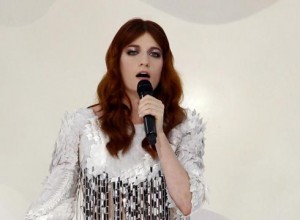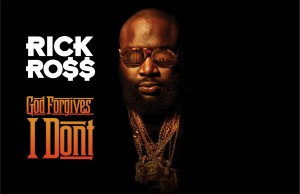 This is the conclusion of yesterday’s guest post by Jessica Misener, which you can read here.
This is the conclusion of yesterday’s guest post by Jessica Misener, which you can read here.
Welch’s brand of majestic tribal-pop “secular gospel,” or what Tom Ewing refers to as “Big Music” in his recent and excellent look at post-U2 stadium rock for Pitchfork, has so many parallels to evangelical worship music. Take for example the track “Spectrum” on Ceremonials, with its language of deliverance (“and we will never be afraid again”); its soaring chorus and hushed middle eight; the vernacular of “light,” “shining,” and illumination. On her debut record, 2009’s Lungs, Welch was even more explicit with her spiritual implications, covering a gospel song: Candi Stanton’s “You’ve Got the Love.”
There’s a crackling nerve to Welch’s voice that makes the ritualistic-religious buzz she’s always selling so convincing, and her words complement the mystique. Take the lyrics from “No Light, No Light,” which I previously mentioned:
You are the hole in my head
You are the space in my bed
You are the silence in between what I thought
And what I said
You are the revelation, some kind of resolution
You are the revelation
And now compare with the lyrics from a popular evangelical worship song, “You Are My All in All”:
You are my strength when I am weak
You are the treasure that I seek
You are my all in all
When I fall down you lift me up
When I am dry you fill my cup
You are my all in all
In both songs, you have a transition to minor chords. Dramatic key changes make your heart leap. Most notably, the second person lyrics personalize the narrative. They force, you, the listener, to participate. In the worship song, you’re addressing God; in Florence’s song, it’s lover qua God.
Evangelical worship music is fascinating to me because it’s so expertly designed to trigger these emotions, which causes you in that setting to relate those emotions to your notion of spirituality. And it’s especially potent in Pentecostalism, which puts a premium on the Holy Spirit and thus the sensual experience of God: A semi-recent study by the University of Canterbury found that Pentecostal-Charismatic churchgoers had stronger “energetic” and “awesome” emotional reactions to a piece of religious music than a non-Pentecostal group.
This is controversial in the context of religion, for good reason, because it smacks of emotional manipulation. Was it the mechanisms of worship music that chipped away at my psyche, breaking down my resistance to the gospel message? Were the songs tantamount to Oz-like fire and smoke that masked what was really happening—or not happening—behind the curtain? Ten years later, it’s not something I haven’t considered.
But what is the effect of similar trappings in Florence’s music if they’re not designed to make you feel those things about God? Ewing, who calls this kind of Coldplay aesthetic “meta-gospel,” says it’s “all about how high the music you’re listening to dreams of being.”
I think a good word to use is ekstasis, which means literally “standing outside one’s self” in Greek. That’s what these stings of transcendence, whether found in Florence or in a hymn, kind of feel like for me. Ekstasis is the word used in Acts 22 when Paul describes his conversion account, the famous “road to Damascus” experience. It’s that feeling of being pulled up to heights, to a personal epiphany; in church, that feeling is given a spiritual gloss, a veneer telling you that this, this, is God communicating to you and pulling you closer.
Ewing, who mentions in the article that he’s an atheist, concludes:
But the Big Music– deploying the emotion of religion within an aesthetic I do relate to– can sometimes push buttons I don’t necessarily want pushed. At its frequent worst, it triggers the same disgusted flight-impulse a TV preacher might. At its rare best, though, it makes me want to believe.
At one point, worship music made me want to believe in religion as evangelicals sell it – and I did. And that’s the question we as listeners ask with this “Big Music,” whether it’s created by Florence or Coldplay or Christian rock bands: “Am I being manipulated or not?” In the context of religion, it obviously has more splenetic implications. But that statement—“music made me want to believe”—is really sort of tautological. We trust and especially value music when it makes us feel and think and feel human. So why should we distrust it just because the ends might lead to something sacred?
I think it’s part of the human condition to want transcendence. We want an experience so powerful that the dusty veneer of the everyday gets peeled back and we finally see the world around us in brilliant color. And where is that power more ontologically present than in art? I’m not saying everyone should listen to religious music–I’m not a huge fan, myself–or even Florence Welch and her ilk, but if music of any stripe can, to quote Tori Amos, shock us sane, maybe we’d do well to let it.











